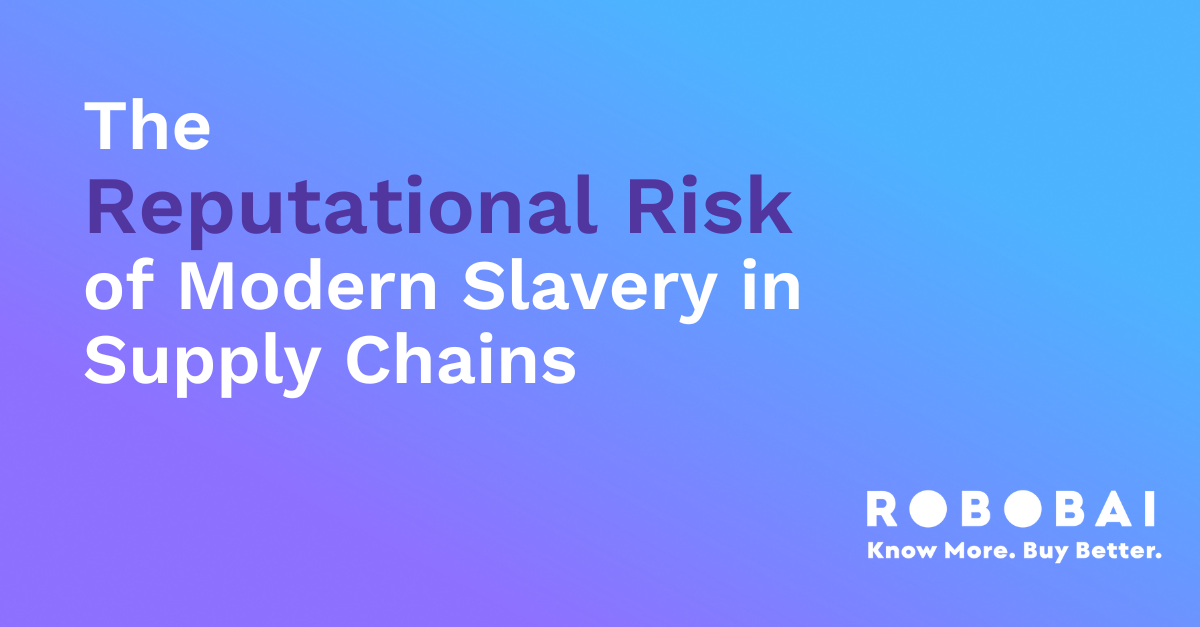Unlock Financial Opportunities with Cardready.io, RobobAI’s New Free Tool for 2025
Cardready.io Helps Global Businesses Optimize Supply Chain Management and Payment Strategies

Global production is defined by intense competition across many sectors. While this competition can lead to innovation, it also has a darker side. The pressure of cutting production costs has resulted in producers and suppliers turning to markets with cheap and flexible labor, often within countries with little to no human rights regulation. Unfortunately, this can lead to exploitation, forced labor, and child labor.
In addition to the primary concern of contributing to human rights abuses, forced labor also poses a significant reputational risk for modern businesses navigating supply chain networks. To decrease the ramifications of modern slavery reputational risks, companies must take a proactive approach to managing their supply chain and building transparent relationships with suppliers.
What is modern slavery?
Modern slavery refers to serious exploitative situations where individuals are unable to leave work, either due to coercion, deception, or threats. It is often used as an umbrella term to describe human trafficking, servitude, descent-based slavery, debt bondage, forced marriage, and forced labor. Worldwide approximately 40 million people are trapped in modern slavery. Out of this number, one in four are children and almost three-quarters are women and girls.
Around 16 million people are exploited in the private sector and are linked to the supply chains providing goods and services to international businesses. No matter whether your company is producing mobile phones, food, or clothes, there is a very real chance that slavery could exist at any stage of your supply chain.
Learn more about the significant risk posed by modern slavery in supply chains in our modern slavery platform.
Signs of modern slavery in your supply chain network
Supply chain networks are generally complex, convoluted, and international. All of these factors make it difficult for businesses to closely examine the various stages of their supply chains including the origins of the raw materials, the manufacturing process, and the eventual transportation and shipping.
To prioritize sustainable sourcing and identify how to prevent modern slavery in supply chains, organizations should:
Certain industries and regions are more vulnerable to modern slavery. This is mostly due to a lack of governmental oversight (from both exporters and importers of at-risk products) and regional conflict.
Modern slavery also infiltrates specific industries within certain regions, resulting in some industries being more prone to modern slavery.
These include:
● Electronics and tech
● Construction
● Steel and automobiles
● Mining
● Garments and textiles
● Agriculture (particularly at-risk agricultural goods are cocoa, cotton, coffee, tea and spices)
It is a business’ moral obligation to be on the lookout for red flags that may indicate modern slavery within their supply chain. Ideally, businesses should examine supplier labor hire practices and employment contracts. Specific warning signs that something is amiss are:
● Confiscation of workers passports
● Underpayment of workers or withholding payment
● Employers charging recruitment fees
● Excessive working hours
● Evidence of physical and/or mental abuse
● Poor accommodation for employees
● Unsafe working conditions
The behavioral signs of modern slavery can be comparatively more difficult to identify. There is no simple definition as to how an enslaved person may behave. When conducting due diligence on contacts, it’s critical to astutely observe the behavior and appearance of employees to determine whether they are safe.
A victim may:
● Appear reluctant to interact with other people. They may seem especially distrustful of strangers or authorities.
● Wear the same clothes every day.
● Have few personal belongings.
● Appear withdrawn, uneasy, or frightened.
● Be dropped off or picked up from work at unusual hours but always in the same way.
● Lack of personal identification.
● Have untreated injuries.
Impact of supply chain slavery on brands
How does modern slavery affect businesses?
Modern slavery in supply chains can trigger a cascade of adverse reactions that have the potential to severely (or even irreversible) damage an organization’s reputation and/ or revenue.
Media reports on modern-day slavery have the power to reshape public perception of a brand.
Adverse media reactions can be particularly embarrassing and harmful for companies with a sustainable or empowering brand reputation.
Social media has provided consumers with a platform to voice their opinions and circulate information, which can result in an ongoing reaction that surpasses the shorter exposure trends of the media.
Increased awareness of modern slavery has had a direct impact on consumer behavior. An MIT study found that consumers may be willing to spend 10% more for a product if they know that it was produced by a company with greater supply chain transparency.
Across the globe, different governments have legislation in place to curtail supply chain slavery in local businesses. Noncompliance with the law can result in various consequences. In the UK, for example, noncompliance with the Modern Slavery Act can result in up to 2 years imprisonment and fines up to 4% of the company’s global turnover.
There have been recent discussions in Australia and Europe about introducing import bans or sanctions to stop companies from importing goods made using slave labor. Such discussions have highlighted the importance of Australian and European businesses preparing for new legislation by initiating better supply chain management.
What should companies do to address modern slavery and protect their brand equity?
Companies have an ethical and legal obligation to monitor their supply chain and take active measures to minimize the risk of modern slavery. There is no single solution that can be put into place to tackle such a prevalent issue. Organizations need to take a proactive and holistic approach when scrutinizing their procurement processes and taking control of their spend analysis
In order to protect their brand equity from slavery in supply chains, organizations can:
Supply chain transparency requires companies to analyze all stages of their supply chain and then openly disclose this information to internal and external stakeholders. This can be achieved through a materiality assessment, which involves identifying, prioritizing and addressing key risks to long-term business value.
Anti-slavery clauses in supplier agreements ensure that suppliers are aware of and comply with anti-slavery legislation.
While the exact wording of your agreements will depend on your circumstance and industry, anti-slavery supplier contracts often include the following:
● Disclosure obligations on the supplier
● Provision of assurances and additional information by the supplier
● Due diligence obligations imposed on the supplier
● Buyer’s right to terminate the contract in the event of breaches by the supplier.
While organizations cannot necessarily be trusted to honestly report on their work practices in a procurement questionnaire, inconsistent or vague answers could indicate a deeper problem.
Audits are a useful initiative that can provide buyers with more accurate insights into the behavior of their suppliers. Regular and unannounced audits allow buyers to more accurately monitor their suppliers and identify suspicious activities.
Companies can introduce greater control into their supply chain by implementing relevant policies that will resonate throughout the supply chain.
Sustainable clothing company Patagonia, for example, determined through an audit that seasonal market changes were contributing to exploitation in their factories. To counteract this problem, the company introduced production schedules to stabilize the factories’ economic conditions and ensure workers earned a stable income.
Technology provides organizations with a current and objective overview of their supply chain; an invaluable asset when it comes to identifying areas of compliance risk.
As an AI-powered procurement management platform, RobobAI allows users to gain a better understanding of their supplier spend. Automation and machine learning enable regular reviews and audits, imparting reliable insights into the current state of your supply chain and areas for improvement.
RobobAI also increases your organization’s visibility over Modern Risk through its Adverse Media, Sanctions, and Modern Slavery products.
Are you interested in understanding how RobobAI could empower your business to know more and buy better?
Request a Demo today to discover how gaining a deeper insight into your supply chain network could enhance your business’s ability to make smarter, more ethical decisions.

Cardready.io Helps Global Businesses Optimize Supply Chain Management and Payment Strategies

Businesses across the globe have had a lot on their plates in the 2020s. For some, modern slavery accountability - whether legislated or not - is...

3 Reasons You Need AI-Powered Spend Analytics. Have you modernized your spend management?